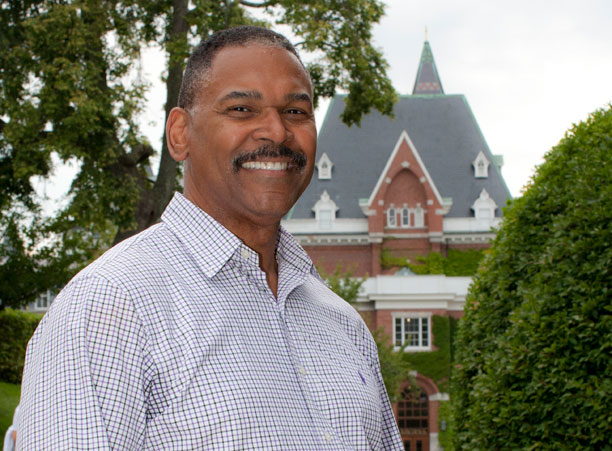There comes a time in everyone’s life, says Eddie Jenkins ’72, when you have the opportunity to make a stand in the service of society. Jenkins made such a stand in 1968 when he joined a group of black students to attend Holy Cross. They were not the first African-Americans on the Hill, but as a group, they began breaking down the racial barriers that had separated white students from a handful of blacks on campus.
“You have to recognize that it’s your moment,” says Jenkins, 61, chief diversity and civil rights officer at the Massachusetts Department of Transportation. “Martin Luther King did his part. Students put themselves on the line at Jackson State. It was our chance to stand up for what was right.”
Jenkins, who lives in Boston’s Roxbury neighborhood, was among five black students profiled in Diane Brady’s new book, "Fraternity," which chronicles their lives at Holy Cross in the late 1960s and early 1970s. The book highlights how the mentorship of Rev. John Brooks, S.J., ’49, who later served as the college’s president, helped them persevere in their undergraduate careers, and beyond.
FOOTBALL SUCCESS
Jenkins’ success running the football for Holy Cross caught the attention of pro scouts, and he was drafted into the National Football League, where he played for three seasons. His prowess in the classroom, meanwhile, led him to law school, and a legal career in both the public and private sector.
In his first NFL season, Jenkins played on the 1972 undefeated Miami Dolphins team and has a Super Bowl ring with 17 diamonds to prove it. Jenkins, who also suited up for the New York Giants, Buffalo Bills and New England Patriots, was in Indianapolis at Super Bowl XLVI, rooting for New England. He and his wife, Linda, are close to Patriots defensive back, Patrick Chung, who is engaged to his wife’s niece. Jenkins says he has taken Chung under his wing, and provides mentoring for the young athlete.
“Patrick has a lot coming at him,” says Jenkins. “I do what I can to help.”
Known for his tackling prowess on kick-offs and punt returns, Jenkins recalls a game between the Dolphins and Cincinnati Bengals. On the game’s kick-off, he raced down field, making a beeline for the fleet-footed Bengals kick-returner. Fielding the kick was none other than Joe Wilson ’73, who was Jenkins’ roommate in what was known as the “black corridor” in Healy Hall, where many African-American students lived.
“Joe fielded the kick-off and I knew he was going to try to run over me,” recalls Jenkins. “But I tackled him and got him down. Then I told him: ‘Welcome to the NFL.’ ”
NOTABLE LEGAL CAREER
Jenkins knew well that football was a young man’s game. He had a plan, enrolling at Suffolk University Law School three days after his gridiron career ended. His legal career began in public service at the U.S. Department of Labor, playing an important role in a landmark decision, Pasula V. Consolidated Coal Co., in which the department backed a coalminer’s right to refuse to work in what he perceived as unsafe working conditions.
He was a prosecutor in the Middlesex County, Mass., district attorney’s office, then opened a private law office in Boston at Washington Street and Massachusetts Avenue, where he practiced for 15 years.
His heart for racial justice drove him into the political arena in 1990, when he challenged Suffolk County District Attorney Newman Flanagan. The DA had ignited racial tensions in Boston that year over the Carol Stuart murder investigation. Stuart’s husband, who later committed suicide, had fabricated the story of a black gunman.
“The police were banging on doors, looking for that phantom black suspect,” says Jenkins. “We couldn’t take the abuse anymore. So I ran, and even though I was hugely outspent, I got 39 percent of the vote.”
COMMITMENT TO PUBLIC SERVICE
He came up short in subsequent runs for Boston City Council and Suffolk County DA. But his commitment to public service, and the law, remained strong. For the past 16 years, he has served as an adjunct professor at Suffolk Law, teaching courses in employment discrimination and pretrial criminal litigation.
In 2003, he was named chairman of the state’s Alcohol Beverage Control Commission, which handles licensing of liquor stores, breweries and wineries and works with municipalities to license bars and restaurants. After five years, he became chief of enforcement at the Registry of Motor Vehicles, where his duties included dealing with fraudulent licenses and those convicted of drunk driving.
His latest appointment — as MassDOT’s chief diversity and civil rights officer — brings him face-to-face with the regulatory framework that was just getting developed when he came to Holy Cross in the fall of 1968, a few months after Martin Luther King Jr.’s assassination. At the top of his agenda is combining the civil rights departments from the state Department of Transportation, MassPort and the Massachusetts Bay Transportation Authority.
Diversity in the workplace remains a potent issue in America. And Eddie Jenkins says he has yet another opportunity to make a stand for the common good.
“Encouraging a diverse workforce is one way to recognize the strengths and talents of all,” he says. “It’s a way to be more inclusive. And it’s very, very American.”
By David McKay Wilson
Related Information:
- Learn more about “Fraternity,” read an excerpt, and see reviews and media coverage
- Read profiles of the other men featured in "Fraternity:"
- Stanley Grayson '72
- Edward P. Jones '72
- Clarence Thomas '71
- Theodore Wells Jr. '72
